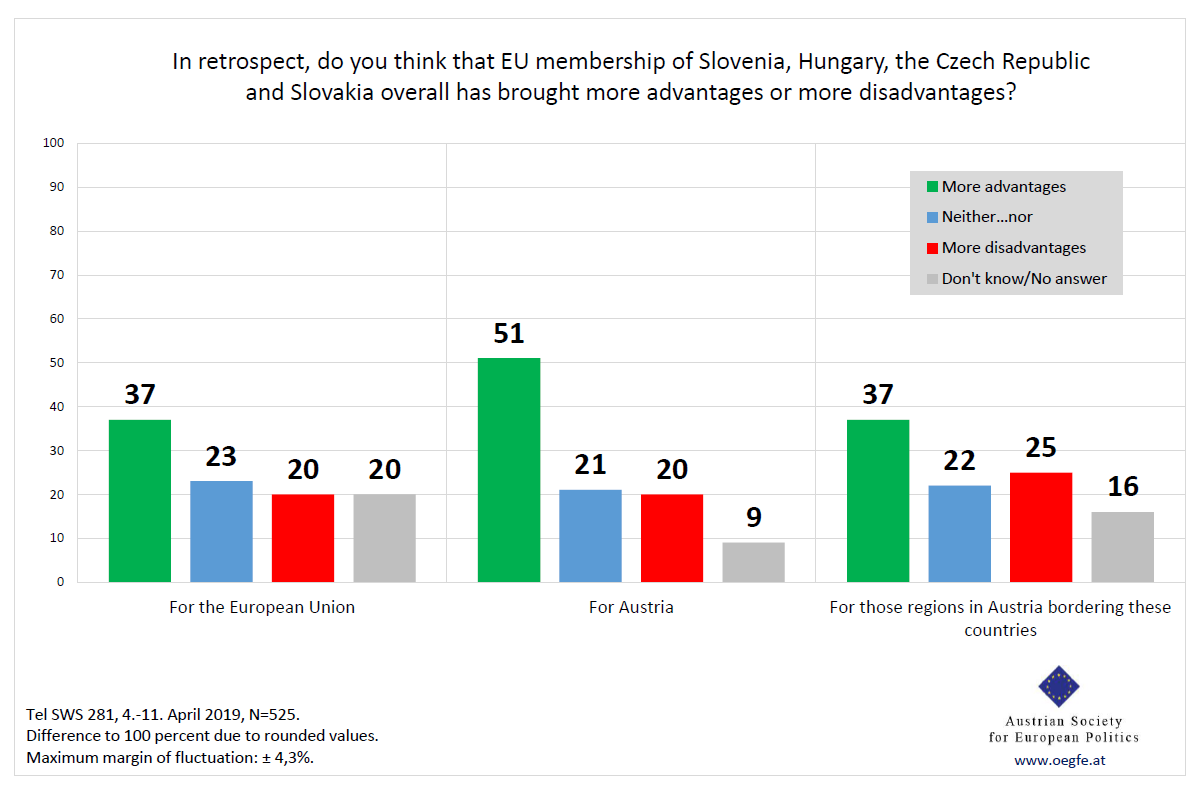Fifteen years ago, on 1 May 2004, the Czech Republic, Slovakia, Hungary and Slovenia became part of the European Union. Eight years ago, the domestic labour market opened up to our neighbouring countries. A recent survey by the Austrian Society for European Policy (ÖGfE) gives an insight how Austrians assess these developments.
A majority of 55 percent of Austrians believe that the EU accession of our neighbouring countries was a “good decision”. In 2010, 56 percent took this view compared to 53 percent in 2014. The number of people who say that integrating our neighbours in the EU was a “bad decision” has declined to 11 percent (2010: 19 percent / 2014: 24 percent). Just under a quarter (24 percent) think that the 2004 enlargement was “neither good nor bad” (2010: 21 percent / 2014: 20 percent), one in ten respondents (11 percent) has no opinion on this topic.
51 percent of respondents believe that EU membership of the Czech Republic, Slovakia, Hungary and Slovenia has brought more benefits for Austria. 20 percent say that the disadvantages prevail, 21 percent have a neutral view (“neither – nor”). One in ten respondents (9 percent) does not comment on this question.
37 percent of Austrians say that the European Union has benefited from integrating the four Central European countries. 20 percent see more disadvantages, 23 percent answer “neither – nor”, a high proportion of one-fifth of respondents has no opinion.
We see a similar assessment regarding the question if Austrian regions bordering the Czech Republic, Slovakia, Hungary or Slovenia have benefited or not since 2004. 37 percent agree, 25 percent do not share this view. 22 percent answer “neither – nor”, 16 percent do not take a position. Six in ten respondents (59 percent) have the impression that EU membership has contributed to bring Austria and its neighbouring countries closer together. One-fifth of respondents do not agree, just as high is the number of those who do not comment on this question (21 percent “do not know / no answer”).
On 1 May 2011, the Austrian labour market opened up to Czech, Slovak, Hungarian and Slovenian workers. While in 2016 Austrians were still somewhat sceptical, recent data show a change in public opinion. In April 2016, 16 percent of respondents said that opening the domestic labour market had “more positive effects”. In April 2019, this number has doubled to 32 percent. Three years ago, for 43 percent the negative consequences prevailed, while today only 27 percent think this way. The number of those who say that the opening of the labour market had “no significant impact” has barely changed (2016: 29 percent | 2019: 26 percent). One in ten respondents cannot comment on this point (2016: 12 percent | 2019: 15 percent).
When it comes to the question of future EU enlargement steps, Austrians remain sceptical. 69 percent say that integrating new member states is “rather not important” (37 percent) for the future of Europe or “not important at all” (32 percent). Only one in five disagrees (22 percent) and says it is “very” (3 percent) or “rather important” (19 percent). Public opinion has hardly changed over the past six years.
By contrast, a deepening of cooperation between the member states is considered a much more urgent issue. A total of 76 percent say that enhanced cooperation is “very” (33 percent) or “rather important” (43 percent) when it comes to the future of the EU. 17 percent do not share this view (“rather not important”: 11 percent | “not important at all”: 6 percent). Again, there are no relevant changes in public opinion since 2013.
The current survey was conducted from 4 to 11 April 2019 by the Sozialwissenschaftliche Studiengesellschaft (SWS) on behalf of ÖGfE (Tel SWS 281). 525 persons were questioned via telephone (Austrian population from the age of 16 / weighted according to gender, age and education). Maximum margin of fluctuation approx. +/- 4.3 percent. Difference to 100 percent due to rounded values. Comparative surveys 2010-2016: SWS






